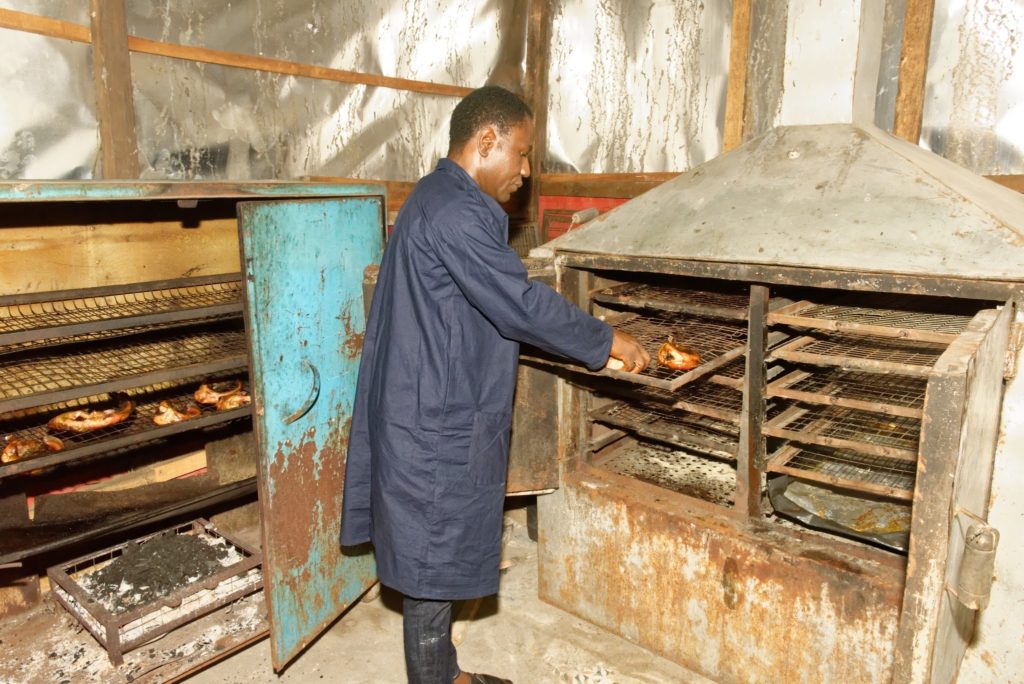Our demonstration pond project has been of great benefit to fish farmers, even for those like Mr. Peter Michael who is currently working on a PhD in fish farming and Mrs. Peters Ugheoke who had been a leading fish farmer for years in Akure, Ondo State. Since the demonstration pond intervention began first as a pilot in 2012 and then as a full-scale intervention in 2014, farmers from around the region have enthused about its impact. Mr. Peter Michael, also a fish farmer based in United Ufuoma Fish Farmers Association (UUFFA) where the pilot was held before it was expanded to reach more farmers, tells us about how the intervention has helped improve his approach to farming.
“Now, we can actually tell you how many bags of feed produces a certain outcome. It has helped significantly to improve our yield. If someone was getting 500kg or 200kg before, they are getting 1.5tons of fish now. THat’s a huge difference in yield and profit.”
The demonstration pond approach makes such a huge difference by directly tackling common fish farming practices that have a negative effect on yield, which helps farmers unlock the true potential of their ponds, while encouraging them to buy good quality fish feed. Mrs. Ugheoke saw the difference a seemingly small change like sorting fingerlings can make in her yield.
“Before the demo pond, we used to want the fast-growing fingerlings, but we learned with the demo pond to change our perception. The bigger fingerlings eat the smaller ones. The demo pond taught us that when you should sort bigger and smaller fingerlings separately. This practice reduces the rate of mortality from the fish’s cannibalism. Often, you would lose over 20% of your stock, or as high as a 40 to 50% mortality rate. When we did this with 2,400 fingerlings, only 70 died. You may end up recording up to 95% survival rate. That’s a huge difference.”
In 2016, this project reached approximately 3,610 farmers and established seven new demonstration ponds in Delta State in partnership with private fish feed companies. These companies provided free inputs under a cost-sharing model for the demonstrations to teach these agronomic practices to farmers as part of their outreach to new markets.

Peter Michael smokes fish after a harvest at his fish pond. Through his work he has been able to link other farmers to 28 million naira in funding for their businesses
Mrs. Ugheoke and Mr. Michael were trained in these practices, and now work as aquaculture consultants to fish farmers. This not only helps make them very sought after in their communities, but it has also helped ensure sustainability by providing a private sector-driven means to improve practices that will survive even if PIND stops work in the sector. Mr. Michael typifies the ways in which this approach can help increase the viability of aquaculture in the Niger Delta.
“I was a tenant, and now I am a landlord,” he told us with a smile. “I have 45 ponds. I have been able to improve my hatchery productions. I have a processing center now. This expansion has been more stressful, and has put me on my toes. Once I do the demo pond trainings, I start getting calls to buy fingerlings and some other things for equipment. Whenever they buy fingerlings they keep dying, so I show them how to manage it. I also consult for these farmers and they pay for my services.“
Mrs Ugheoke admits that she was not sure she needed the demo-pond training, but joined because she knew how important it would be for the many fish farmers in her farming cluster who look up to her.
“They invited me for the Training of Trainers in 2015, and that was when we did the demonstration pond with Aller Aqua, United States Agency for International Development (USAID)’s Maximizing Agricultural Revenue and Key Enterprises in Targeted Sites (MARKETS) II, and PIND, as well as with the association clusters here. In the process of the demo, PIND told me they’re training people and giving grants to contribute to the cost of training. That’s how I became a demo pond trainer with PIND in 2016.”
Both of these farmers say that the demonstration pond intervention has provided them a platform to help others. Mr. Peter has been able to link 12 people to small grants worth a total of 28 million naira to invest in their own fish farming businesses, and Mrs. Ugheoke is using her skills to improve the viability of fish farmers in her cluster.
“I have 25 farmers that I work with. Some of them had gotten frustrated and even folded up their businesses, so they come to me and ask how to make money from fish farming. With the demonstration pond, they see for themselves how the farming is going. They see that it is working for others, and are now ready to take it on.”


